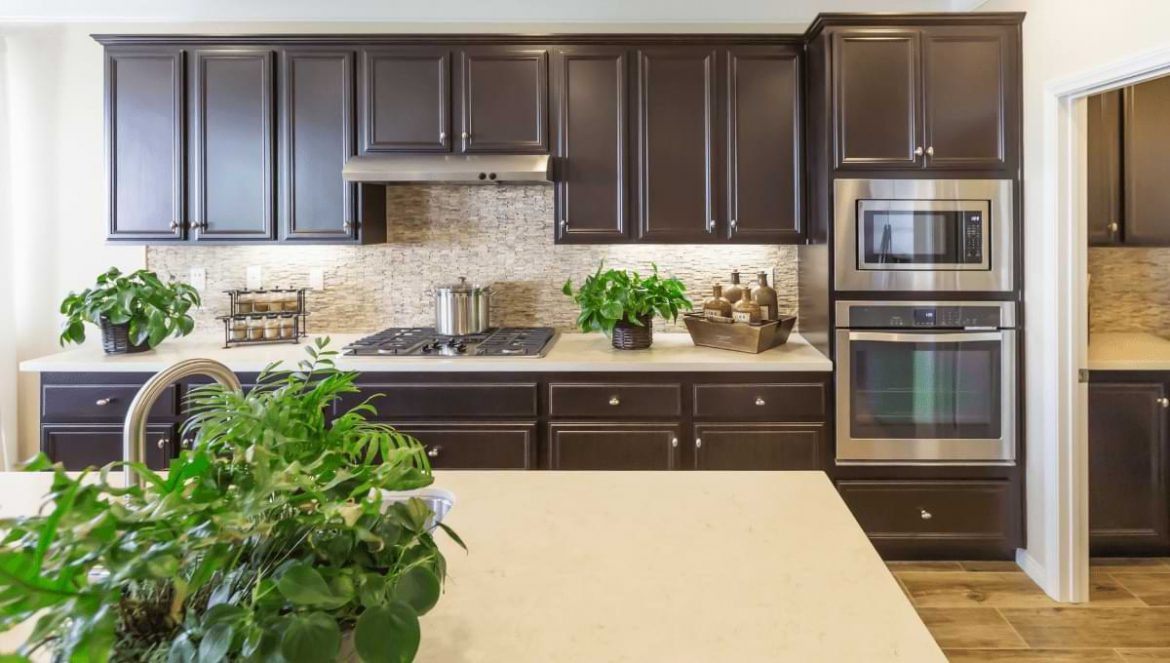Table of Contents
Countertops are the backdrop of a kitchen. Picking a kitchen countertop is one of the most important decisions you will make for your home. Ask any interior designer.
Yes, it’s not an exaggeration. The countertop will be part of every aspect of your life. You will enjoy family meals, spill your morning coffee, and savor your evening beer while leaving a condensation ring on it. The countertop will endure everything from hot pans to hammering meat tenderizers and sharp knives. You get the picture.
There are a lot of factors that go into choosing a countertop material, especially when you are building your own kitchen. You can choose from a variety of countertop materials, but the most popular among them are granite, quartz, and Corian. Each of them makes for an excellent countertop material, and that’s where the choice gets trickier.
Whether you choose granite, quartz, or Corian should be based on your kitchen needs. We will help you to make that decision.
What Are These Countertops Made Of?
Before determining why a certain material is better for you, you must first learn about these materials.
Granite
Granite is a natural stone sourced from igneous rocks created by the cooling of volcanic lava. Granite usually contains multiple mineral components, including feldspar, quartz, and so on. The aesthetics of the stone vary, depending on whether it’s sourced from Italy, Brazil, India, or China.
Quartz
Countertop quartz material is not pure natural quartz. 10% of it is polyresin, and pigments are added to the rest 90% natural quartz. Quartz is grounded and mixed with glue and other minerals to produce quartz countertops. Natural quartz is found in Japan, Brazil, the Alps, and the United States.
Corian
Corian is a 100% artificial material that contains aluminum trihydrate, acrylic resin, and other natural minerals. The solid surface was first invented in 1967, and since then, it has been manufactured by DuPont.
What Will They Look Like In My Kitchen?
The countertop’s appearance sets the tone for the kitchen décor. Fortunately, countertop materials are available in different designs. An interior designer usually suggests one of the three materials depending on the appearance of each stone.
Granite
Granite adds a luxurious tone to your kitchen. It comes in a variety of textures, patterns, and styles. You can get granite in every possible color. From almost pure ivory whites to salt and pepper to more exotic color options, the choices before you are endless.
Quartz
If you are looking for more color and design options for your countertops, then explore quartz countertops. Quartz is designed to look like natural stone. But, since it is manufactured, it is possible to get a quartz countertop in every possible color. For the same reason, quartz is available in myriad patterns and styles. Quartz has a timeless appeal and an uncanny ability to resonate with every home décor.
Corian
The 100% synthetic material offers many choices in terms of colors and patterns. Corian derives its appeal from its smooth and seamless appearance. Many consider it a worthy alternative to laminate. Corian used to be incredibly popular, but its popularity has steadily declined.
How Do They Perform?
All three countertop materials are long-lasting. Granite is a naturally occurring stone, while quartz is essentially a manmade stone. Both are durable, low-maintenance, and robust. These materials can endure a lot of heat and weight with minimal care.
All three can be cleaned using regular household cleaners or soap water. Cleaners with stronger chemicals are abrasive and should be avoided. The surfaces should also be dried quickly after cleaning.
Here is a breakdown of how these different surfaces hold up to regular wear and tear.
Staining
Granite, quartz, and Corian are all resistant to staining. Granite is naturally porous, so it stains easier than non-porous quartz and Corian. So, it is important to apply sealant on the granite countertop as part of its regular maintenance. However, quartz and Corian can still stain. So, it’s recommended that you clean all liquids as soon as they spill.
Scratching
Granite and quartz are immune to scratches from knives and other sharp tools in the kitchen. However, Corian fails on this front as the manufacturers of the countertop note that their product will witness scratching from everyday use.
Heat Damage
Quartz and Corian do not fare well when it comes to heat resistance. So, you have to place a pad or trivet to protect these surfaces from heat damage. Granite offers better protection against heat. However, we strongly recommend using a buffer while working on a granite countertop.
Everyday Use
It is important to take good care of countertops to maintain their durability. Hammering, jumping, continuous sitting, and other such activities can produce cracks on these countertops. Avoiding such activities is usually enough to extend the life of your countertops by years.
What Will It Cost Me?
Get multiple quotes for various countertop options from different vendors. This will help you get a general idea of the price range and quality you can expect. Further, an interior designer may help you find the best prices by leveraging their existing vendor relationships.
As a general rule, granite is the least expensive countertop material. Granite countertops usually start at $35 per sq. ft. and go up to $100 per sq. ft.
Corian, and quartz are almost similar in price, ranging between $40 to $150 per sq. ft.
They Are All Good Options, But What Suits Your Needs?
Granite, quartz, and Corian are popular for different reasons. They have impressed millions of homeowners worldwide. So, you cannot go wrong with any one of them. However, your typical kitchen requirements can make one countertop material more suitable to your needs than the others.
It would be wise to consult an interior designer before taking the dive. After all, you are committing to a choice you will have to literally live with through the next decade.
